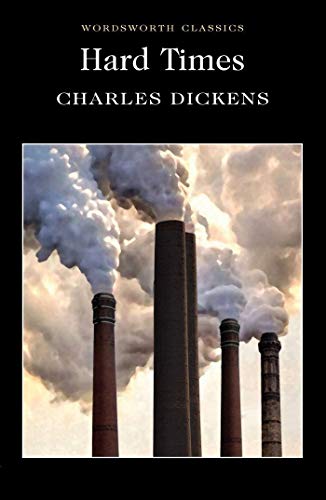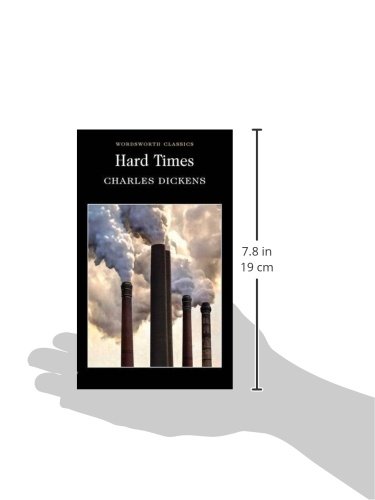



Wordsworth Editions Hard Times
S**S
Dickens and the North
"Hard Times" is Dickens most concise and perhaps his most his most carefully constructed novel. Unlike his early books such as "The Pickwick Papers" where whole chapters can be presented as separate short stories, everything in this novel, all the characters and every incident feeds into its main theme - the contrast between utilitarian and imaginative values, the latter represented by Mr Sleary and his circus.Other books by Dickens are probably richer in laughter, most of the humour in this work is biting satire, especially that directed towards 'self-made' factory owner Josiah Bounderby. Its characterisation is also less vivid than some other Dickens books. The principal 'hero' of the novel Stephen Blackpool is rather one dimensional. Perhaps its most developed characters are the Gradgrind family. The father being (perhaps unfairly) based on the contemporary utilitarian philosopher John Stuart Mill. The 'heroine' of the book is his daughter Louisa, who develops as a human being despite her self restricting utilitarian education. No real solution to the sufferings of the oppressed workers of Coketown is given, as the union movement is presented in a highly negative light. It is difficult to see how the Coketown people could better their lot without some form of organized labour, especially given heartless bosses like Bounderby and a seemingly supine parliament.Whatever its philosophical paradoxes, "Hard Times" is a great book and shows the triumph of the human spirit over the abstractions of a narrowly materialistic outlook.
M**T
It's grim up north
I think this is Dickens' only novel set in the North and there might be a reason for that. His grasp of the Lancashire dialect seems rather loose, so be prepared to decipher Stephen's dialogue (it's written phonetically).You thought things were rough in London; London is Arcadia compared to this place. Hard Times is set in a fictional industrial town called Coketown, where life revolves around industry and fact and the whole town is surrounded in grey smog. Thomas Gradgrind is a schoolteacher who drums facts into his pupils and forbids any notions of fantasy. He extends this principle of raising children on facts alone to his own children, dream-starved Louisa and selfish Tom. When circus girl Sissy Jupe's father abandons her, Gradgrind adopts her, but she is far less receptive to his education. Gradgrind's best mate is Josiah Bounderby, a factory owner who prides himself on his troubled background and casts himself as a man who has risen from the gutters. Gradgrind marries off Louisa to Bounderby and as she grows up, she realises that an upbringing based on facts is not an adequate education. In a subplot, Stephen, a factory worker, wants to marry his sweetheart Rachel but an undisolvable first marriage and shunning by his workers complicates things.Dickens uses satire effectively in the novel, particularly with the characters of Gradgrind and Bounderby. Coketown becomes a living character and Dickens really evokes a world entirely alien to us. It's not really an accurate depiction of the north but an exaggerated fantasy conception of it. The characters are all intriguing (although you'll be wishing for Tom's death throughout), although Dickens is guilty of not giving them very satisfactory endings. There are no happy endings here but only one of them is truly tragic. Perhaps a slightly longer novel might have been appropriate to round things off a little better.Dickens' decision to write dialogue phonetically in the case of working class Stephen and lispy circus owner Mr Sleary is perhaps ill-advised. It adds some character but it takes some time to read, particularly in Sleary's case.Although the novel is not structurally satisfactory, there are many things to enjoy about the novel. It feels like a great novel trying to break out.
H**N
A good story buried in a long social message
This is a fine book, of two halves.The first part sets the scene for Dickens' social message: the inequality between rich and poor; the harsh living and working conditions; the Utilitarian facts-only education of the Gradgrind children (Louisa and Tom), with no room for play, hope or imagination; the over-importance attached to being self-made, which causes Josiah Bounderby, a successful local industrialist, to exaggerate his humble beginnings and to deny his own mother's contribution to his success.Against this grand backdrop is played out the unhappy marriage of Louisa and Bounderby- not helped by the meddling of Mrs Sparsit-; of Tom's drift from the straight and narrow; and of the unfulfilled love of Stephen and Rachael- a very touching tale. Plus the entertainment and humour of Mr. Sleary's horse-riding circus.For me, Dickens spends too much time painting the scene before getting to the stories, which are really compelling- the last hundred pages flew by.
E**A
Avoid if it's your first dip into Dickens
Although the use of setting is rather spectacular, the book lacks narrative and plot. Quite a bore, especially the characters, who seem to have no conviction over their lives or independence, ageing rather badly from a feminist literary perspective. Wouldn't recommend for anyone wanting to read Dickens or delve into Classic literature.
A**R
A book for our times
This is certainly a book for our times. It is one of Dickens industrial novels, set in the north of England, and questions the prevailing social and economic policies that were then in place (1850s). The fact that is relevant to today should give us all pause for thought!
Trustpilot
1 month ago
2 months ago